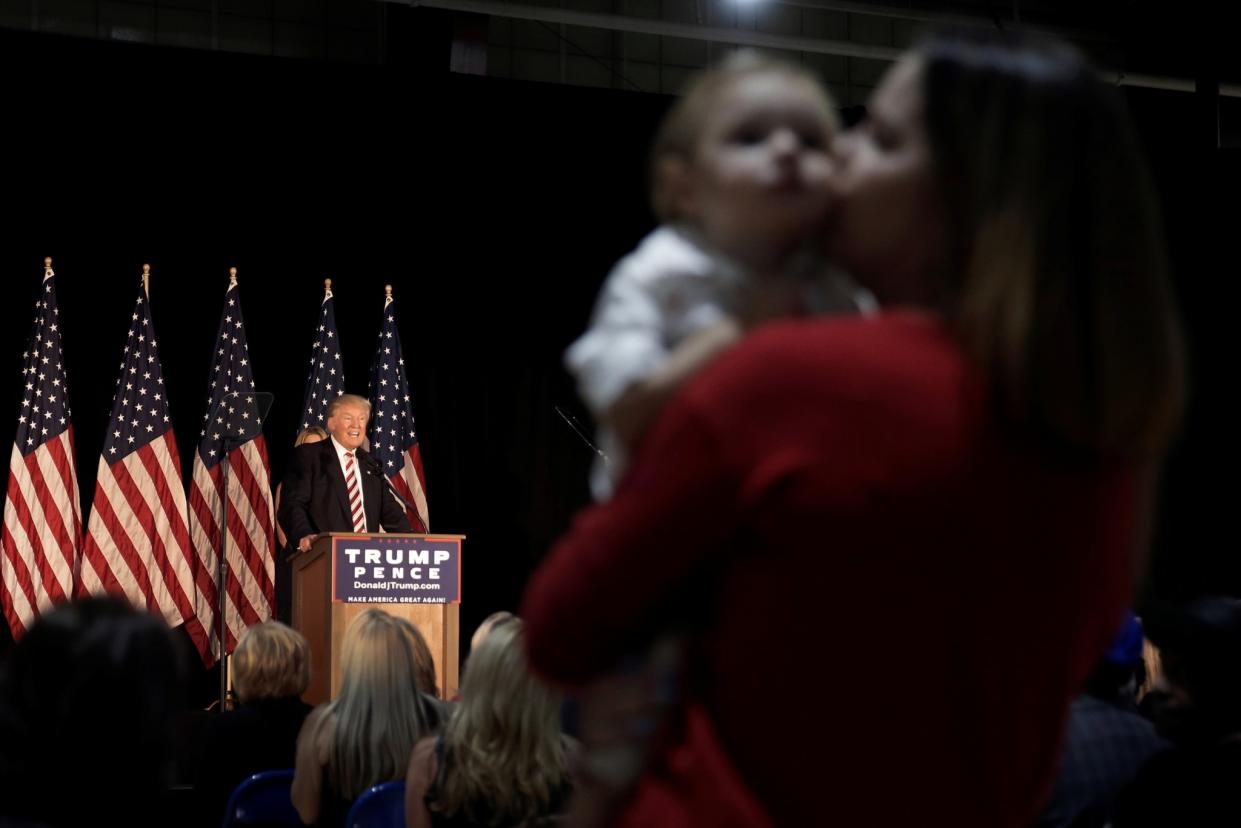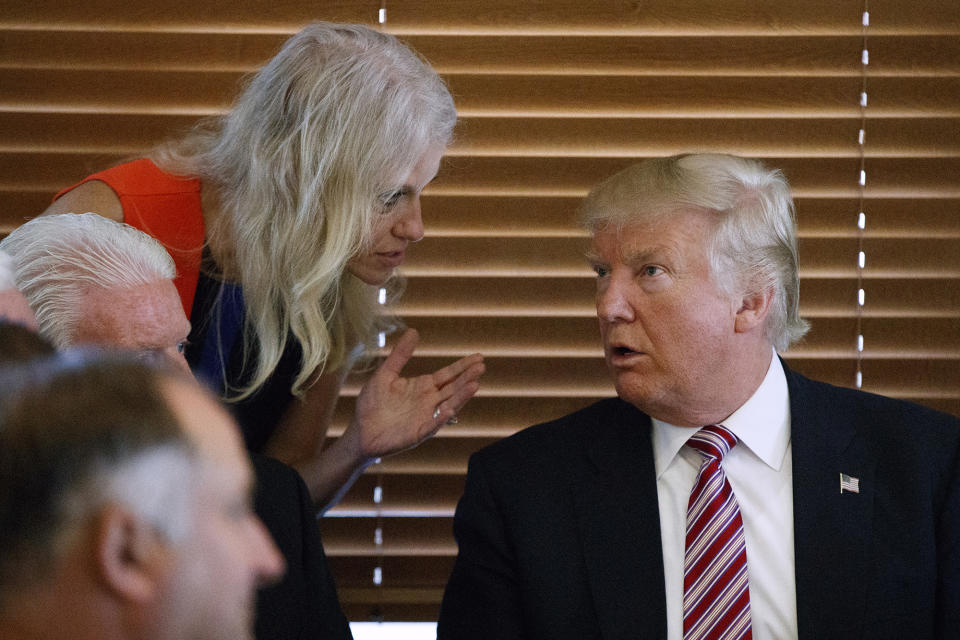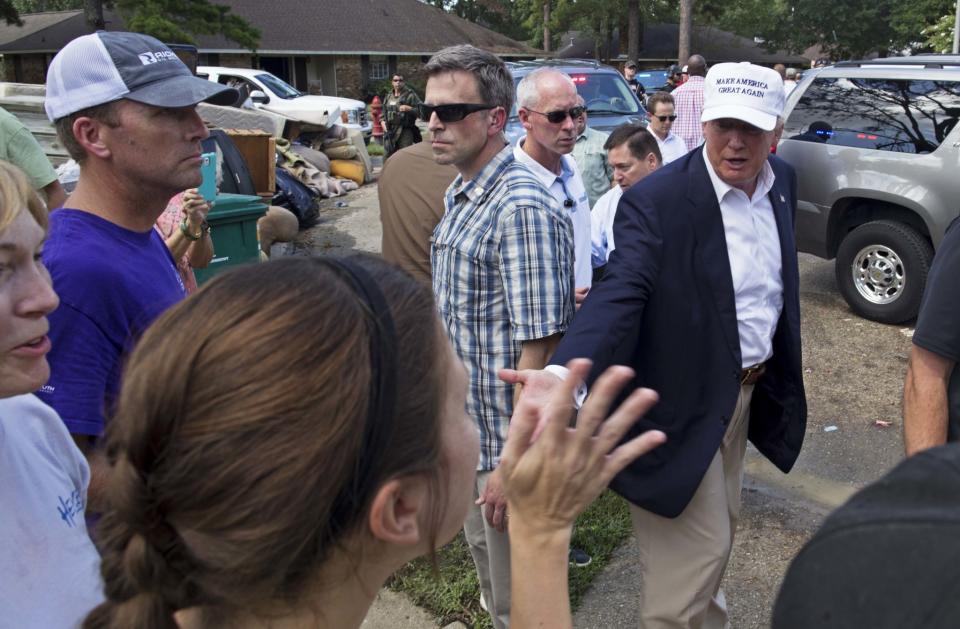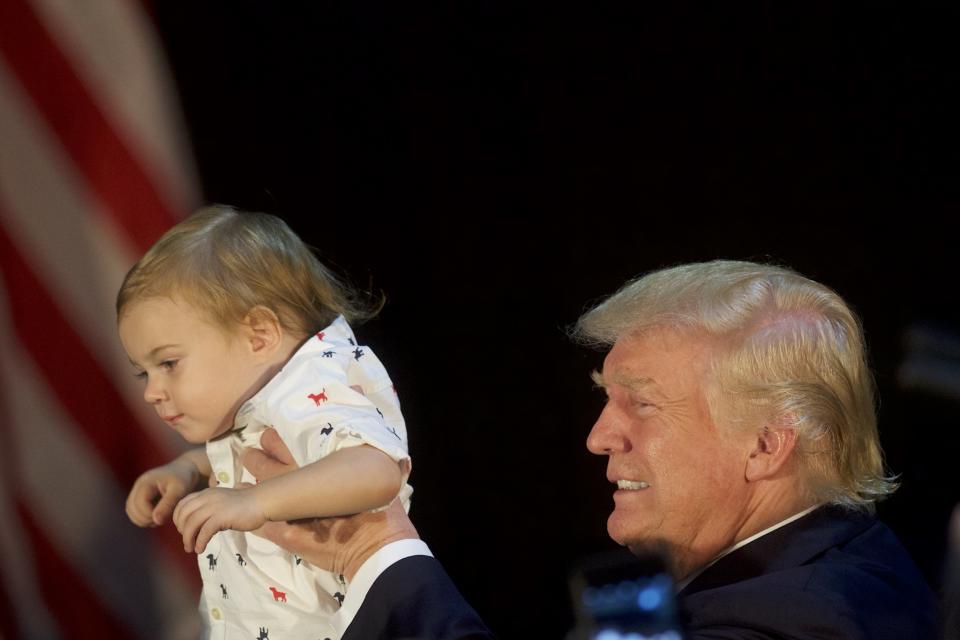A kinder, gentler Trump retools his message for moms

ASTON, Pa. — Donald Trump was about halfway through his speech detailing a litany of policy proposals that would help ease the cost and burden of childcare on working parents when he was suddenly interrupted by a loud squeal.
A few feet away, a fidgety toddler tangled with his mother in the audience of a couple of hundred people gathered in a community center. The Republican presidential nominee was here in the Philadelphia suburbs to deliver what his campaign billed as a major policy address Tuesday night.
On stage, Trump briefly paused, and in the back, reporters wondered what would happen next. As a candidate, the impetuous celebrity businessman has famously shown little patience for interruptions, even from the children of his supporters. Just a month ago, in a moment that was replayed again and again on cable news, Trump seemed to grow irritated by sound of a crying child at a rally in Virginia, telling the mother half-jokingly, “Get that baby out of here!”
But on Tuesday, Trump seized on the restless child as a prop to illustrate his plan to help children and their parents. “See!” he declared, briefly breaking from his scripted remarks. “That will be our first child!” The audience, which was packed with women, laughed and clapped approvingly, as Trump smiled and quickly turned back to his teleprompter to continue the speech.
It was a lighthearted but telling moment for a brash candidate who has been famously undisciplined and unfiltered in his unlikely bid for the presidency. Trump used to be known for his rambling stump soliloquies, in which he seemed incapable of not voicing every thought in his head, no matter who it offended or how off-topic it was.

But in recent weeks, under the influence of a new team of advisers including campaign manager Kellyanne Conway, the candidate has shown a new devotion to staying on message — relying at nearly every stop on the use of the teleprompter, a machine he once routinely mocked. While he’s still known to ad lib, Trump has embraced more inclusive language, making direct appeals to African-Americans and minorities. And he has agreed to participate in smaller events like roundtables and town halls, which aides believe present him to voters as not only a blustery entertainer presiding over raucous rallies but also someone capable of being more even-tempered and presidential.
The latest iteration of the new Trump has come in recent days as the GOP nominee, looking to take advantage of his rival Hillary Clinton’s time away from the political stage to recover from pneumonia, has sought to recast his candidacy yet again — presenting himself as a softer, more thoughtful contender who is also focused intensely on policy.
After months of offering few specifics on the policy agenda he would pursue as president and how exactly he would carry out his vague promise to “Make America Great Again,” Trump has delivered two of the most detailed speeches of his campaign over the last week — including Tuesday’s childcare address and another last week focused on military readiness, both staged in the politically crucial battleground state of Pennsylvania.
Slideshow: Children at Trump rallies >>>
And on Thursday in New York, Trump is scheduled to deliver another major policy speech on what he said will be his economic vision for the country — remarks that are expected to be more detailed than the economic blueprint he unveiled in Detroit last month. “It’s going to be something special, like something this country hasn’t seen in many decades,” he said Tuesday night, previewing the remarks with his typical Trump flourish.
At the same time, the GOP candidate and his aides have sought to contrast that new policy focus with Clinton’s reputation as policy wonk by accusing her of peddling “tired” ideas and “failed policies” that have been pitched before. Those attacks have taken on a new dimension in recent days, as Trump has sought to capitalize on Clinton’s statement at a fundraiser last Friday that “half of Trump supporters” fall into a “basket of deplorables.”
Speaking at a rally in Iowa hours ahead of his child care speech Tuesday, Trump bluntly accused Clinton of running a “policy-free campaign.” “She offers no ideas, no solutions … only hatred and derision,” Trump declared. “It’s true, you see that.”
With less than eight weeks to go before Election Day and a little over a week before Trump is set to meet his Democratic rival on the debate stage for the first time, the GOP nominee and his aides see the coming days as an important window for him to make his case anew to voters who have been skeptical of his surprising bid for the White House. That group includes white women and college-educated suburban swing voters — two blocs that have leaned Republican in recent elections but with whom Trump has struggled to gain ground against Clinton.

But to the surprise of many Republicans both close to and outside of the campaign, Trump has taken steps to turn the tide as the campaign enters its final stretch — and so far, he appears to be sticking with it. After a rough August, in which Trump lost ground in the polls and was assailed by members of his own party for verbal and political missteps, including his criticism of the parents of a Muslim soldier killed in the line of duty, the candidate agreed to retool his message and schedule. His new approach is intended to redefine his image with swing voters turned off by the candidate’s inflammatory rhetoric that has been criticized as, among other things, anti-woman and anti-immigrant.
In recent weeks, Trump has taken his campaign to unlikely spots for a Republican candidate, including black communities where he sought to portray himself as inclusive and a candidate of change. “What the hell have to you got to lose?” Trump regularly asks minority audiences. Over the last month, Trump made a surprise visit to Baton Rouge, La., to meet with residents dealing with the impact of historic floods. He took his campaign to an inner-city church in Detroit and visited with pastors in Philadelphia. And on Wednesday, he’s scheduled to visit the Detroit suburb of Flint, where he’ll meet with families affected by tainted drinking water.
With polls showing Trump’s support among black voters in the single digits, it’s unlikely the GOP candidate will win over major numbers of African-Americans. But his aides acknowledge the candidate’s message is aimed not only at black voters but also at women and suburban swing voters who have been turned off by the candidate’s divisive rhetoric — portrayed by critics as inherently racist — going back to his campaign kickoff, when he called Mexican immigrants rapists and murderers. The goal, said one Trump adviser who asked not to be identified, has been to show that “Donald Trump isn’t who critics say he is.”
And one way of proving that, aides say, is a new focus on specific policy heading into the final stretch of the campaign — to prove that Trump is more than just bluster. It’s a shift in strategy Trump aides say insist was pushed by the candidate himself — even though Trump has in the past has said he finds policy speeches boring to listen to and boring to give.
“As of late, his policy speeches are specific roadmaps so that when people say, ‘I just don’t know what they stand for, they’re just attacking each other…’ That’s not true when it comes to him,” Conway said. “You may disagree with every single policy he’s put forth, but at least you can read it, you can examine it, you can digest it, you can assess it.”
But one danger in Trump suddenly pursuing a policy-based strategy is that it calls attention to how little he has actually invested in policy. While Clinton, like other presidential candidates on both sides of the aisle before her, has a policy shop made up of scores of experts on dozens of policy matters, Trump has a much smaller blueprint. He largely relies on his chief policy adviser, Stephen Miller — who previously worked on Capitol Hill for Alabama Sen. Jeff Sessions — and a rotating cast of others, some formal advisers and some who weigh in occasionally on campaign matters. That includes Sessions and former New York Mayor Rudy Giuliani as well as the candidate’s family members, such as his eldest daughter, Ivanka, and her husband, Jared Kushner.

One open question is whether Trump has enough time to undo the damage that he has done to his own campaign — particularly among women. For months, airwaves in Pennsylvania have been blanketed by television and radio ads that rehash the real estate mogul’s controversial statements, including his attacks on Fox News host Megyn Kelly and other women.
But on Tuesday, Trump sought to undo that damage by using one of his greatest strengths — his daughter Ivanka, who joined him in taking his message directly to the people he needs to back him in November: a roomful of women in the pivotal suburbs of Philadelphia. The policy and the speech, crafted in part by Ivanka, was notable in its expansion beyond GOP orthodoxy — including a pledge to allow six weeks mandatory paid maternity leave, an idea that has been rejected by many Republicans who have argued that requirement is too onerous for businesses.
But as striking as the policies were, equally as striking was Trump’s delivery. Speaking in an unexpectedly subdued tone, the candidate pledged to be an impassioned defender of working moms and to help families struggling under the weight of childcare costs in a way they had never been helped before.
“Right now, our politicians have locked our country into endless fights about small and petty things. I’m asking the nation to lift our sights, and to imagine what we can accomplish if we work together, trust each other, and put the needs of our own citizens first,” Trump declared.
In an aside at Clinton, whom he did not name, Trump criticized those in Washington who have “disdain for the views, beliefs and attitudes of those who don’t have political power.” “Those in leadership must put themselves in the shoes of the laid-off factory worker, the family worried about security or the mom struggling to afford childcare,” he said. “That means we need working mothers to be fairly compensated for their work and to have access to affordable, quality childcare for their kids.”
As Trump spoke, Ivanka stood behind her dad’s left shoulder — an unusual move for a candidate who typically stands solo on stage during campaign events. And afterward, she and father worked the room together, shaking hands and posing for pictures.

At one point, the mother whose child had interrupted Trump’s speech approached the rope line, and the candidate, who has only rarely interacted with babies on campaign trail, grabbed the toddler and raised him high in the air a few times like a scene from “The Lion King.” The crowd applauded and laughed, and photographers got the shot.
Speaking to reporters afterwards, the mother could barely contain her delight at Trump’s interaction with her son. “I was trying to get him to shake his hand, and he picked him up like he was Simba,” she said.
Hunter Walker contributed to this story

